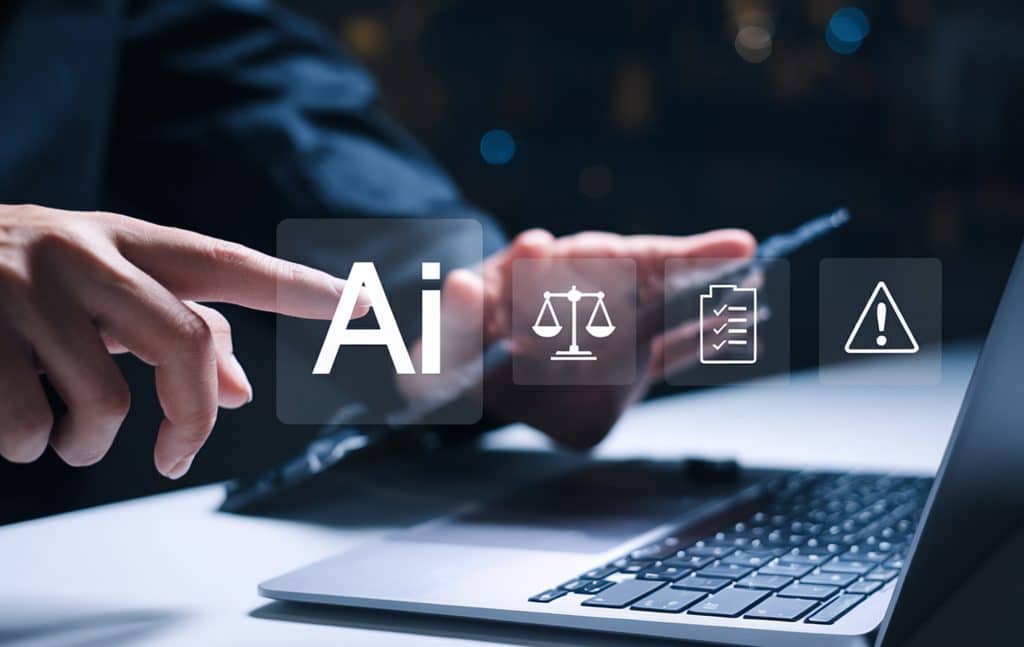AI and its potential to transform legal systems worldwide

Advertisements
AI has the potential to revolutionize legal systems worldwide by improving efficiency, enhancing access to legal services, and reshaping client interactions.
At the same time, it presents challenges that must be addressed, such as ensuring data privacy and minimizing algorithmic bias.
The impact of AI on legal systems is an emerging topic that’s quickly gaining traction. With the promise of making legal processes more streamlined and accessible, we could be on the brink of a major transformation.
Advertisements
Imagine a world where navigating the law is no longer a complex and opaque task, but something that is intuitive and efficient for everyone. Curious about how AI might reshape the future of justice? Let’s explore the possibilities.
How AI is reshaping legal research
The landscape of legal research is evolving rapidly, driven by advancements in artificial intelligence. AI tools enable researchers to sift through vast amounts of data quickly, making the process of legal research not only more efficient but also more accurate.
These innovations are allowing legal professionals to find relevant case law, statutes, and legal precedents with greater speed and precision.
Advertisements
As a result, many lawyers and law firms are already experiencing significant improvements in their workflows, reducing the time and cost associated with traditional research methods. This shift is paving the way for a more streamlined and effective legal system.
Benefits of AI in Legal Research
AI offers numerous advantages that can transform how legal professionals approach their work.
By utilizing AI technology, lawyers can access resources that were previously time-consuming and labor-intensive to gather.
- Increased accuracy in case law analysis
- Time-saving capabilities through automated searching
- Improved data organization for easier access
- Enhanced predictive analysis for better outcomes
Continuing on the subject, AI also allows for natural language processing, which lets users query databases using everyday language.
This innovation makes it easier for those without legal training to conduct research effectively. Imagine being able to ask a question and receive detailed insights in just moments!
Another essential aspect is the predictive analytics feature of AI. It analyzes past case outcomes and can provide insights into how current cases might unfold. This capability helps lawyers develop strategies based on data rather than just intuition.
Challenges to Consider
While the benefits of AI are clear, there are also challenges that legal professionals must address.
Ethical implications arise, particularly concerning data privacy and the accuracy of AI recommendations. It is crucial for legal experts to remain vigilant about the sources and biases of AI systems.
As we move forward, collaborations between technology experts and legal professionals will be key to ensuring that AI is used responsibly and effectively.
This evolution in legal research is just the beginning, paving the way for even more advancements in the future.
Transforming client interactions with AI
AI is transforming client interactions in the legal field, enhancing communication and making it more efficient.
By leveraging artificial intelligence, law firms can gain deeper insights into client needs, allowing them to respond more proactively and with greater precision.
AI tools can assist in streamlining client onboarding, managing case progress, and providing personalized advice, ultimately improving the client experience.
This technology not only saves time but also strengthens relationships between lawyers and their clients, enabling a more responsive and tailored approach to legal services.
Enhanced Communication
Through AI-powered chatbots, clients can receive answers to their questions at any time. This instant access reduces wait times and improves overall satisfaction. The ability to communicate seamlessly is crucial in today’s fast-paced world.
- 24/7 availability for client inquiries
- Quick response times to common questions
- Personalized client experiences based on previous interactions
Additionally, AI can analyze previous client communications. This helps lawyers prepare for meetings, ensuring they address pertinent issues efficiently.
With these insights, attorneys can offer more tailored and personalized advice, ensuring a deeper understanding of each client’s unique needs and enhancing the overall client experience.
Building Stronger Relationships
By using AI tools, law firms can gather valuable data about client preferences. This information can be used to improve services and establish stronger connections. Understanding a client’s specific requirements helps in crafting personalized solutions.
As firms implement AI, they find that trust increases. Clients appreciate the efficiency and attention to detail that this technology can offer.
Building trust is vital in legal interactions, making AI a crucial element in fostering positive relationships.
In conclusion, with the rise of AI, client interactions are becoming more meaningful and productive. It is evident that this technology is paving the way for a collaborative future between clients and their legal representatives.
AI’s role in case management and prediction

AI’s role in case management is becoming increasingly essential for law firms aiming to boost efficiency and achieve better outcomes.
By integrating artificial intelligence into their workflows, legal professionals can manage cases more effectively, streamline administrative tasks, and track key deadlines and milestones with precision.
This allows for improved organization, faster response times, and ensures that no important detail or deadline is overlooked.
As a result, AI not only enhances case management but also contributes to better client service and stronger overall performance within law firms.
Streamlining Case Management
With AI, law firms can automate routine tasks, freeing up valuable time for attorneys to focus on more complex legal matters. AI tools can track deadlines, manage documents, and organize case files systematically.
- Automated reminders for important deadlines
- Efficient document organization
- Streamlined communication between team members
By leveraging machine learning, AI can also help analyze vast amounts of case data, identify patterns, and predict future trends.
With these insights, lawyers can better prepare for upcoming trials or negotiations, significantly enhancing their strategy.
Predictive Analysis in Legal Cases
Another significant feature of AI is its ability to conduct predictive analysis. This means it can assess data from previous cases to forecast outcomes based on various factors. Understanding potential outcomes enables lawyers to make informed decisions.
As data is continually fed into AI systems, the predictions become even more accurate over time.
For instance, a lawyer could review past cases similar to a current one and use this information to guide their legal strategy, increasing their chances of success.
This integration of AI into case management not only improves efficiency but also enhances the ability of legal teams to deliver results for their clients.
As technology advances, law firms that embrace AI will likely stay ahead in competitive environments, reshaping the future of legal practice.
The ethical implications of AI in law

The rise of AI in law brings forth a range of ethical implications that cannot be ignored. As artificial intelligence continues to play a more prominent role in legal processes, it is crucial to carefully examine how these technologies influence the justice system and broader society.
Key concerns, such as data privacy, algorithmic bias, and the potential for automation to replace human judgment, must be addressed to ensure that AI enhances the principles of fairness, transparency, and accountability in the legal field.
Ensuring ethical AI deployment is crucial in shaping the future of justice and maintaining the integrity of legal systems worldwide.
Data Privacy Concerns
One main ethical issue involves data privacy. AI systems require access to vast amounts of personal data to function effectively.
This reliance poses risks related to how data is collected, stored, and utilized. Lawyers must ensure that client information remains confidential while using these advanced tools.
- Ensuring compliance with data protection laws
- Protecting sensitive information from unauthorized access
- Maintaining transparency about data usage
Moreover, the ethical use of AI in law is paramount. Legal professionals must navigate the delicate balance between leveraging AI for efficiency and safeguarding their clients’ rights and privacy. This responsibility is crucial in building trust with clients.
Bias and Fairness in AI Systems
Another significant concern is the potential for bias in AI algorithms. Because these systems are trained on existing data, they may inadvertently perpetuate societal biases. This can lead to unfair treatment of certain groups in legal proceedings.
Legal experts must assess AI systems for bias and ensure that decisions are made based on fairness and justice.
They also need to be aware of how AI-generated recommendations may impact vulnerable populations.
As AI continues to evolve, it is crucial for legal professionals to remain vigilant about these ethical considerations.
By prioritizing ethics in AI implementation, the legal field can better serve clients and uphold the principles of justice.
Future trends: AI and global legal systems
The future trends of AI in global legal systems are both promising and exciting, offering the potential to revolutionize the way legal processes are conducted and improving outcomes for both professionals and clients alike.
As artificial intelligence continues to evolve, its integration into legal practices worldwide is expected to bring significant changes, reshaping how law is practiced and transforming traditional workflows.
With AI streamlining processes, enhancing research, and improving decision-making, the legal field is poised to become more efficient, accessible, and responsive to the needs of both clients and professionals.
Global Adoption of AI Technologies
Many countries are beginning to recognize the value of AI in enhancing legal efficiency. From automated document review to AI-powered legal research, these technologies will dramatically reduce time spent on routine tasks.
- Faster case processing with AI tools
- Increased accessibility to legal resources for clients
- Streamlined workflows within legal firms
Additionally, AI can help bridge gaps in legal services across different regions. For instance, remote and underserved areas will benefit from increased access to legal advice and representation through online platforms powered by AI.
Improving Access to Justice
One significant impact of AI is its potential to improve access to justice. Automated systems can provide legal information and guidance to individuals who may not afford traditional legal services.
This democratization of law enables a wider audience to understand their rights, making legal knowledge more accessible and empowering individuals to navigate the legal system with greater confidence.
AI-driven chatbots can assist clients in navigating complex legal processes, such as filling out forms or understanding court procedures. As these technologies progress, clients can receive relevant support quickly and efficiently.
Another vital trend is the collaboration between AI and legal professionals, where AI enhances efficiency and decision-making, while legal experts provide essential judgment.
By working together, technology and attorneys can create innovative solutions, enhancing not only accuracy but also outcomes in legal cases. This partnership is critical in shaping the future of law.
In the coming years, we can expect AI to play a pivotal role in revolutionizing global legal systems by increasing efficiency, accessibility, and overall effectiveness.
In conclusion, the integration of AI into legal systems worldwide demonstrates immense potential. As we look ahead, it is clear that AI will enhance efficiency, improve access to legal services, and reshape client interactions.
By addressing ethical concerns and embracing innovative solutions, the legal profession can navigate the challenges of tomorrow.
The future holds exciting opportunities for both legal practitioners and their clients, promising a more accessible and fair justice system.
FAQ – Frequently Asked Questions about AI in Legal Systems
How can AI improve efficiency in legal practices?
AI automates routine tasks, allowing lawyers to focus on complex legal issues, thus increasing overall productivity.
What are the ethical concerns surrounding AI in law?
Key concerns include data privacy, bias in AI algorithms, and maintaining client confidentiality while using AI tools.
How does AI enhance access to legal services?
AI provides tools that make legal information more accessible, allowing underserved communities to gain legal support through technical platforms.
What future trends can we expect from AI in legal systems?
AI will likely lead to more efficient case processing, improved client interactions, and better predictive analytics in legal decisions.





